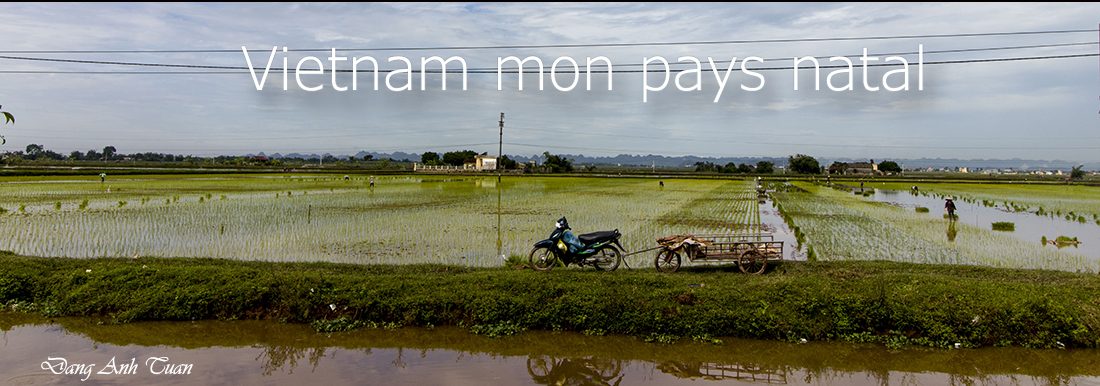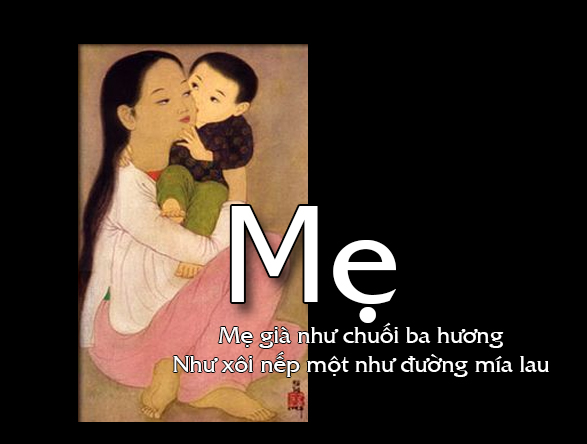Chữ nầy rất quen thuộc với người dân Việt. Chúng ta thường dùng để gọi mẹ hay má. Nhưng nó cũng có một ý nghĩa cá biệt đối với chúng ta. Nó có phép nhiệm màu đến đổi mỗi lần nhắc đến thì tự nhiên gợi cho mỗi người chúng ta biết bao nhiêu kỷ niệm, luyến tiếc và trìu mến. Khi ghép với các chữ như « Quê », « Đất » thì nó ám chỉ đến tổ quốc và quê hương. Nó còn tượng trưng cho gạch nối giữa tất cả người dân Việt dù ở phương trời nào đi nửa. Nó làm ta chợp nhớ đến thời kỳ trong huyền thoại mẹ Âu Cơ lúc từ biệt cha rồng Lạc Long Quân và 50 đứa con, dẫn 50 đứa con còn lại về miền núi, dựng nên đất nước nầy, một bức khảm của các dân tộc đầy màu sắc rực rỡ và cũng là một thế giới vi mô phức tạp nhất ở thế giới. Nó làm vĩnh cửu mối quan hệ mật thiết và trìu mến mẹ dành cho con mà các nghệ nhân Việt như Mai Thứ, Nguyễn Thị Hợp vân vân… không ngần ngại chọn làm đề tại trong việc thực hiện các tác phẩm của họ. Nó còn làm cho mỗi người chúng ta sống trở lại với tình yêu và lòng hy sinh mà mẹ đã dành cho chúng ta từ bao nhiêu năm. Hình ảnh của mẹ với khuôn măt lo lắng, chăm sóc con mỗi lần ốm đau, tay thì không ngớt phe phẩy suốt đêm cái quạt, đã được lưu giữ lại trong ký ức tập thể của chúng ta. Một cái nhìn hạnh phúc, những biểu hiện của cuộc sống nồng nàn, sự giản dị trong nghèo khổ, những nét khắc khổ trên mặt bởi những nổi lo âu hằng ngày, chúng ta đều nhận thấy có ở nơi người mẹ Vietnam.
Lúc nào cũng nâng niu con với các bài hát ru khi con còn bé. Lúc nào cũng thay thế chồng làm nghĩa vụ quân dịch để dạy dỗ con nhỏ. Sự hy sinh nầy, hình ảnh nầy, chúng ta lúc nào cũng biết đến qua « Hòn Vong Phu ». Đây là câu chuyện của người phụ nữ sững sờ như tượng đá trên đỉnh núi, tay bế con, chờ mãi ngày trở về của chồng từ phương Bắc. Cũng là hình ảnh của một người phụ nữ nhẫn nhục trong một xã hội Khổng giáo, một người mẹ can đảm, nhẫn nại và cần kiệm. Lúc nào cũng tận tụy cho gia đình, nhất là với các con. Dù tuổi nào đi nửa, chúng ta vẫn được sự chú ý và thương yêu của mẹ. Hình ảnh nầy nó sống mãi ở trong lòng người dân Việt. Chúng ta có thể bỏ qua tất cả chỉ trừ khi nào ai xúc phạm đến Mẹ. Mẹ là gương mẫu của sự can đảm, bền bỉ, dịu dàng và nhẫn nhục. Cố nhạc sỹ Y Vân đã miêu tả qua nhạc phẩm « Lòng Mẹ ». Nhà văn Khái Hưng của nhóm « Tự Lực văn đoàn » đã minh họa được sự hy sinh của mẹ qua tác phẩm « Anh phải sống ». Đây cũng là một câu chuyện của một người mẹ hy sinh để nước cuốn đi mong chồng ráng sống để nuôi con.
Mẹ không phải chỉ có nghĩa là người sinh ta ra mà thôi mà nó còn nói lên sự gắn bó sâu sắc, khó tả và mật thiết của tất cả người dân Việt dành cho mẹ, gia đình, tổ tiên, làng mạc và nhất là cho quê hương.
Lòng mẹ ( Y Vân) avec la chanteuse Như Quỳnh
Ce mot est très familier pour les Vietnamiens. Il est employé pour désigner maman ou mère. Mais ce mot a une signification plus particulière chez les Vietnamiens. Il est tellement magique qu’il ravive en chacun de nous tant de souvenirs, de regrets et d’affections lorsque ce mot est évoqué.
En le combinant avec d’autres mots tels que « Quê », « Ðất », cela désigne notre patrie. ( « Ðất Mẹ », Quê Mẹ »). Il symbolise le trait d’union de tous les Vietnamiens de tout bord.
Il nous permet de rappeler l’époque légendaire où la mère Âu Cơ se fut séparé de son mari et de ses 50 enfants en emmenant ses 50 autres enfants pour donner naissance à une mosaïque d’ethnies colorées, un microcosme ethnique le plus complexe du monde. Il éternise la relation intime et affectueuse entre la mère et l’enfant que les artistes vietnamiens n’hésitent pas à prendre souvent comme thème dans la réalisation de leurs œuvres. Ce mot fait revivre en chacun de nous l’amour et le sacrifice que la mère a donnés depuis tant d’années à son enfant. L’image d’un visage maternel, veillant sur son enfant, la main agitant inlassablement un éventail la nuit lorsque celui-ci était malade, a été ancrée pour toujours dans notre mémoire collective. Un regard heureux, des expressions de vie intense, une simplicité dans la pauvreté, des traits burinés par la sagesse et par les soucis quotidiens sur le visage, on les trouve toujours chez une mère vietnamienne.
Celle-ci dorlotait souvent son bambin avec les berceuses lorsque celui-ci était encore en bas âge. Elle remplaçait souvent son mari qui devait remplir son service militaire pour élever et éduquer son bambin. Ce sacrifice, cette image, on l’a toujours à travers l’histoire » Hòn Vọng Phu ». C’est l’histoire d’une femme pétrifiée au sommet de la colline, son enfant dans ses bras, guettant le retour de son mari parti sur les frontières.
C’est l’image d’une femme résignée dans le carcan confucéen, d’une mère courageuse, patiente et diligente. Elle consacre toute sa vie pour sa famille, en particulier pour ses enfants. Ceux-ci, quel que soit leur âge, continuent à bénéficier de son attention et de sa tendresse même s’ils deviennent adultes. Cette image est très vivace chez un Vietnamien. Celui-ci peut se passer de tout sauf de « Me ». Ce mot « Me. », combiné avec d’autres mots vietnamiens devient une injure insupportable. Me c’est l’exemple du sacrifice, du courage, de la ténacité, de la tendresse et de la résignation. Le compositeur vietnamien Y Vân l’a décrit dans sa chanson Lòng Mẹ. Ce sacrifice, l’écrivain Khái Hưng du groupe Tự Lực Văn Ðoàn a réussi à l’illustrer parfaitement dans son roman Tu dois vivre (ou Anh phải sống). C’est l’histoire d’une mère préférant être noyée par les flots tumultueux et suppliant son époux de survivre pour élever son enfant.
En un mot, Me ce n’est pas seulement maman mais c’est aussi l’attachement indéfectible, profond et intime de tout Vietnamien à sa mère, à sa famille, à ses ancêtres, à son terroir et en particulier à sa terre natale.
This word is very familiar for the Vietnamese. It is used to mean mom or mother. But this word has a more particular significance for the Vietnamese. « Mẹ » is so magic that when evoked, it revives in each of us many memories, regrets, and affections.
By combining this word (Me) with other words such as » Quê » , « Ðất, it indicates our motherland (« Ðất Mẹ, Quê Mẹ »). It symbolizes the hyphen between all Vietnamese across any border. It allows us to recall the legendary time when mother Âu Cơ was separated from her husband and her 50 children while taking her other 50 with her, giving birth to a colored mosaic ethnicity, an ethnic microcosm the most complex in the world.
It perpetuates the intimate and affectionate relationship between the mother and the child that Vietnamese artists do not hesitate to often take as a topic in the realization of their works. This word revives in each and every one of us the love and sacrifice the mother gave her child for so many years. The image of a maternal face taking care of her child, her hand flapping a fan untiringly all night long when the infant was sick, has forever been anchored in our collective memory. A happy glance, some expressions of intense life, a simplicity in poverty, some traits carved by wisdom and daily worries on her face, all of these can be found in a Vietnamese mother. She is the one who often rocks her baby in a cradle with nursery .
Often she replaced her husband who was drafted for military service in raising and educating the little child. This sacrifice, this image, is found in the story » Hòn Vọng Phu », which is the story of a woman petrified at the top of a hill, her child in her arms, looking out for the return of her husband who had left for the frontiers. It is the image of a woman resigned to the Confucian yoke, that of a courageous, patient and diligent mother. She devotes all her life to her family, in particular her children, who regardless of their age continue to have her attention and tenderness even if they become an adult. This image is always vivid in the mind of a Vietnamese. He can forget all but « Mẹ. » ( Mom ). This word « Mẹ », combined with another Vietnamese word will become an unbearable insult. « Me » (mother) is an example of sacrifice, courage, tenacity, tenderness, and resignation. « Mẹ » is described by Y Vân, a Vietnamese composer, in his song « Lòng Mẹ ». In his novel » Anh phải sống » ( You Must Live ), writer Khái Hưng of the Tự Lực Văn Ðoàn group in his novel succeeded in illustrating the sacrifice of a mother who preferred to be drowned by the flooding currents, begging her husband to try to survive for the upbringing of their child.
In a word, « Mẹ » is not only mom but also the indestructible, intimate and profound attachment of a Vietnamese to his mother, his family, his ancestors, his soil, and his country in particular.


